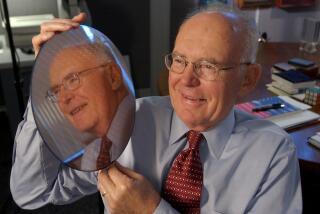At Hewlett-Packard, Carly Fiorina snuffed out a beloved tech culture

Republican presidential candidate Carly Fiorina speaks at a town hall meeting Tuesday in South Carolina.
Reporting from Palo Alto — It’s hard to overestimate the impact that two young Stanford graduates, working in a small wooden garage behind a brown shingled house in 1939, had on the world of high technology. Without David Packard and William Hewlett, there would probably be no Silicon Valley.
The pair were known not just for technical innovation and global success. They were accidental corporate chieftains who created an ethos of profitability, humility and collegiality that came to be known as “the HP Way.”
Their doors were not just always open; they didn’t even have doors. They enshrined the idea of “management by wandering.”
“Bill and Dave would talk to anyone,” said Jerry Cashman, who worked as HP’s Work/Life manager from 1983 to 1999. “They would plop themselves down and say, ‘How’s it going?’”
The next two CEOs, John A. Young and Lewis Platt, rose through the ranks and ran the company the same way. Then, in 1999, Carly Fiorina arrived. Hewlett-Packard, arguably, has never fully recovered.
She was the company’s first outside CEO, a whip-smart rock star of a businesswoman. She was hired to restore a sense of urgency to HP, which was becoming known more for its printers and cartridges than its innovative products.
At first, Fiorina seemed to embrace the founders’ philosophy, said people who worked closely with her. She carried a copy of Packard’s book, “The HP Way,” and even quoted from it. She updated the creed in an expensive ad campaign, creating something called “Garage rules” that got mixed reviews from employees and was brutally spoofed in a video by then-rival Sun Microsystems.
TRAIL GUIDE: All the latest news on the 2016 presidential campaign >>
Fiorina was fired in 2005, after the company’s first massive layoffs, and a disastrous merger with Compaq that had been opposed, vocally, by the founders’ children.
“Undoubtedly some shake-up was necessary,” said Carmel Mayor Jason Burnett, 39, a grandson of Dave Packard and a trustee of the Packard Foundation. “But she didn’t take time to understand what was of value to HP and ended up destroying much of what made the company great over many decades.”
That is the consensus of many who worked with her.
“The HP Way only lives in the hearts and the minds of employees who were there before Carly and those who remember the power and wisdom of Bill and Dave’s lessons,” said Marlene Somsak, HP’s former media relations manager, who left HP a year after Fiorina was hired.
The change was immediately apparent.
“A chill descended,” Cashman said. “She would spend the day in her office not interacting with any of the HP people.
“For me the seminal moment was one day when I was coming to work, there was Carly and an exact duplicate of the HP garage, for a commercial taping,” Cashman said. “There were two guys working a crane, with a shade that was 40 feet by 80 feet, and I said, ‘What’s that for?’”
It was a shade for Fiorina, who narrated and starred in the commercial, to protect her eyes from the sun.
“I was flabbergasted,” Cashman said. “Our first value was profit, and here she was using all this money? I walked away in complete disgust. It was all marketing and no substance.”
Fiorina’s predecessors knew the HP Way in their bones. Neither Young nor Platt felt the need to post his own photograph next to those of the founders at corporate headquarters here at 3000 Hanover St., as Fiorina did.
Brad Whitworth, an HP marketing and communications executive who now works at Cisco, said, “One of my vice presidents said she ought to come down and do the ‘management by wandering around’ since it’s a hallmark of the company. She thought it was a waste of time. She just didn’t see the value of sitting down with employees.”
Hewlett and Packard owned small jets that employees used for trips to company outposts in Colorado, Oregon or Idaho, but Fiorina had a Gulfstream for her personal transport only, said John McGowan, who worked as a manager at HP from 1978 to 1999. (Platt, by contrast, always flew coach.)
Fiorina’s crisp, no-nonsense delivery on last week’s debate stage in Simi Valley – and her pitch-perfect take-down of the blustery Donald Trump – won her points among likely Republican voters.
“She has an amazing ability to connect with people,” said Carl Guardino, who worked briefly at HP before Fiorina’s tenure and now runs the Silicon Valley Leadership Group, a trade organization of nearly 400 tech CEOs that was founded in 1977 by David Packard. “If anyone was surprised by how well she did at that debate, then they don’t know Carly Fiorina.”
But Fiorina’s mangled account of a Planned Parenthood sting video during the debate has raised questions about her faithfulness to the truth. The charge is familiar to people who worked with her at HP.
Shortly after she started, Whitworth said, she spoke to a group of HP marketing and communications employees at a company event called Brand Jam 2000.
See the most-read stories this hour >>
Fiorina gave an embroidered account of how Hewlett and Packard sold their first invention, an audio oscillator, to Walt Disney Studios for the soundtrack of “Fantasia,” a story that most HP employees know by heart.
In Fiorina’s telling, Whitworth said, Walt Disney invited two unknown Palo Alto engineers to Los Angeles to discuss making a machine for the movie soundtrack he had in his head. It was pure fiction.
“Walt did not get on the phone and ask Bill and Dave to come down,” Whitworth said. (Actually, as Packard recounted in his 1995 memoir, “The HP Way,” Disney’s chief sound engineer found the device at a technical conference in Portland.)
Whitworth asked Fiorina’s speech writer where the story came from. “He said, ‘I don’t know.’”
Not exactly the HP Way, but then again, not much about Fiorina is.
robin.abcarian@latimes.com
Twitter: @robinabcarian
MORE FROM ABCARIAN:
In the GOP debate spin room, the truth goes for a whirl
‘Anchor baby’ is a slur against Mexicans: Trump should knock it off
Almonds are no longer villains — or scapegoats — of the drought






